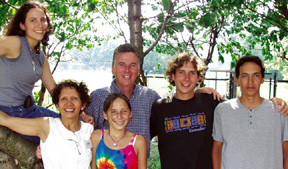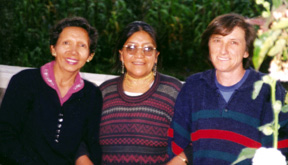Remembering Riobamba
Now in Canada after 13 years in Ecuador, the time is right to reflect on the experience and thank God for what I have lived and learned
By Julia Duarte
October 2006
Return to Table of Contents
Print Article
In our first year of mission in Riobamba, Ecuador, we witnessed the struggle and pain of the poor, especially the Indigenous people. Despite this challenging reality, we were full of hope, energy and a tremendous desire to share our lives with theirs.
 L-R: Evita, Virginia, José and Pancho. These four young people were born and raised in a missionary family that has served in Peru, Panama, Ecuador and now Canada.
L-R: Evita, Virginia, José and Pancho. These four young people were born and raised in a missionary family that has served in Peru, Panama, Ecuador and now Canada.
That was July 1993. Our four children were still young (between the ages of 13 and five), and my husband Tom and I juggled our time every day trying to satisfy our children’s needs and trying to walk with the people in mission. As our children grew older we assumed more responsibilities and the time flew by so fast that now, looking back, those 13 years seem like a dream to me.
Leaving Ecuador this year, saying goodbye to the people, friends and family was difficult. I experienced this same sadness when we ended our mission work in Peru and Panama. Each time, I have had to learn again that this is our life. As a missionary, I have to be willing to go wherever there is a need and I can make a contribution to filling that need. And I have to be willing to deal with the feelings of separation and loss when the time comes to move on.
Now back in Canada, my mind fills with memories of Ecuador. The time is right to reflect on the experience and to thank God for what I have lived and learned. I wish also to honour the people I worked with and the richness that we shared.
The Indigenous Formation Centre, made up of men and women formed to be leaders in the Church and in their communities, has a special place in my memory. There I have seen the fruit of my work.
For four years Mama Rosario was one of my students in the methodology course for adult education. Later, she and I taught this course together. Her knowledge of traditional Indigenous games enriched all of us in the group.
When I met Delfin he was director of the Indigenous Formation Centre, yet he had not finished high school. I was one of the people he came to for tutoring and he eventually received his diploma with much dedication and effort. He then went on to university while at the same time working as co-vicar to the bishop in the diocese’s pastoral outreach to the Indigenous. He is now president of the Indigenous Movement for the Province of Chimborazo.
Stella is a missioner from Columbia whom I had the privilege to work with and who always inspired me with her energy, perseverance and patience. She worked as Director of the Rural Formation Centre (for Mestizo peoples). Because of her, many Mestizo (mixed Spanish and Indigenous heritage) men finished their high school education while preparing to be leaders of their communities. These same students became the first seminarians at the diocesan rural seminary—Christ, The Good Shepherd. This is a unique seminary, not just because it focuses on mature vocations from poor and rural areas, but also because it is a seminary founded by Stella, with the support of women active in the Diocese of Riobamba.
 L-R: Julia with her friends Nina, a lawyer, formerly the External Affairs Minister, and one of the leaders of CONAIE, an Indigenous Confederation; and Julia Serrano, a theologist. Riobamba, Ecuador.
L-R: Julia with her friends Nina, a lawyer, formerly the External Affairs Minister, and one of the leaders of CONAIE, an Indigenous Confederation; and Julia Serrano, a theologist. Riobamba, Ecuador.
Another area of work was the Pastoral Migration Program that supports the efforts of Colombian refugees and Ecuadorian migrants. The migrants leave home to find work elsewhere. Their children walk with money in their pockets because of their parents’ remittances, but they also walk with sadness and loneliness in their hearts. The family separation allowed us to share our hope and faith with each other.
Each Colombian refugee’s story is a testimony of love but also of suffering due to the injustices lived. The refugees are also victims of their government’s corruption. Alone and without rights, they struggle each day to survive. The Colombian people I worked with taught me the meaning of having courage in moments of great adversity. They also shared the taste of their friendship and food from the south of Columbia.
Working among the abandoned elderly in Riobamba Diocese, I found the desire to live and share. They did not care how far they had to walk to arrive at the Saturday soup kitchen on the patio of the cathedral. There they received a meal and enjoyed music and conversation with each other and with the people serving them. These elderly and the pastoral groups involved, particularly individuals such as Leonor and Teresa, were a gift to me. They helped to deepen my understanding of the significance of loving life and enjoying each moment that we have, despite the circumstances.
Too young to die
Angela Toaza was an Indigenous woman too young to be a mother and to have died senselessly. She, as many other Indigenous girls, was full of dreams that go further than their communities. She was one of the young women who received a scholarship sponsored by generous Canadian supporters and managed by the Scarboro Ecuador mission team.
When she became pregnant at 15, Angela’s goals were reduced. Worse yet, her boyfriend beat her. As a consequence, her baby was stillborn and a few days later she, too, was dead. This experience was traumatic not just for her family, but also for those of us who knew her and especially for the other scholarship students. Boys and girls alike began to question the meaning of life, love and sexuality. Angela’s tragic experience made me re-examine my level of connection with the students and their needs.
Women are accustomed to hard work, perseverance and struggle. In almost all actions within and outside the Church, women take part and in so doing bring their dreams to reality. Some of the lay missionaries were Margarita, Ana Paola, and the “other” Julia (Serrano). We carried out actions in Riobamba such as the city’s First National Women’s Meeting to analyze the situation of women inside the Church.
Working outside the Church were the members of the Women’s Forum: Lucita, Cecilia, Rocío, Elena, Aurora, Susana, Martha and others. Together we worked to create the Family Court to defend women’s rights, especially against domestic violence.
With each action, we learned to fight for our rights as women and of our potential and strength when we act together. Several women internationally expressed their support in person and with funds. Debra, Gillian, Julie, Sue, to name a few, came from faraway countries to inspire and be in solidarity with what we were doing.
Thirteen years can be a lifetime. Each of these women mentioned (and there are many more) has a place in our hearts. I give thanks to God for the experience and for the richness that each person brought to our life as a family. What a blessing to have had them in our path.
Return to Table of Contents
Print Article